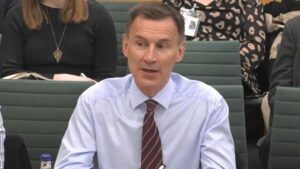
Government borrowing in September was lower than most economists had expected but remains high, figures show.
Borrowing – the difference between spending and tax income – was £14.3bn last month.
This was £1.6bn less than a year earlier, but the sixth highest in September since records began in 1993.
The statistics come ahead of the Autumn Statement in November, but so far the chancellor has downplayed the possibility of any tax cuts.
Economists had predicted government borrowing to be £18.3bn last month, while the Office for Budget Responsibility had forecast the level to be £20.5bn.
The better-than-expected numbers from the Office for National Statistics (ONS) have prompted some, such as the right-leaning Institute of Economic Affairs think tank, to suggest there is now room for “some well-targeted tax cuts” in the Autumn Statement.
Chancellor Jeremy Hunt is also under pressure from some Conservative MPs to announce plans to lower taxes before the next general election, calls which have increased following the party’s double by-election defeat on Friday.
Craig Tracey, MP for North Warwickshire, said cutting income tax or national insurance would be the best way to make voters feel better now. “The thing [voters] need to see is an immediate impact on their bottom line,” he said.
And former Tory minister John Redwood called for taxes on self-employed people to return to pre-2017 levels and for the VAT threshold to be raised for small businesses.
The Resolution Foundation, which campaigns on improving living standards for those on low to middle incomes, said high inflation had pushed up the nominal value of the government’s tax income, which had given a “short-term” boost for the chancellor ahead of his budget update.
But Cara Pacitti, senior economist at the think tank, said the short-term gain was “likely to be more than offset by longer-term pain” caused by higher interest rates.
“Together, this is likely to reduce the chancellor’s already limited room for manoeuvre,” she added.
Mr Hunt appears to have all but ruled out near-term tax cuts to date, saying they are “virtually impossible” and that the government needs to prioritise bringing down inflation.
Responding to the latest borrowing figures, Mr Hunt said the government’s spending on debt interest was twice the level it was last year and was “clearly not sustainable”.
But he said the government “had to borrow during the pandemic to protect lives and livelihoods” and blamed Russia’s invasion of Ukraine for having “pushed up inflation and interest rates”.
Read more:
Government borrows less than expected in September





